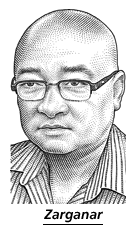 Burma’s junta has arrested dissident comedian Zarganar and put a stop to his aid work for Cyclone Nargis victims. Rohan Jayasekera reports
Burma’s junta has arrested dissident comedian Zarganar and put a stop to his aid work for Cyclone Nargis victims. Rohan Jayasekera reports
The Burmese junta, criticised at home and abroad for its incompetent handling of the Cyclone Nargis disaster and for seizing emergency aid intended for its victims, has further dismayed its critics by arresting the Burmese dissident comedian Zarganar and halting his rescue works.
Zarganar, who put his considerable name behind an independent aid campaign after the disaster, was arrested on 4 June, according to reports by the authoritative Burmese news website the Irrawaddy.
‘The objective seems to be to silence one of the best-known critics of the regime,’ said Index on Censorship chief executive Henderson Mullin. ‘The junta has not only silenced him, they have put a stop to one of the few actions that have been able to turn words of sympathy into life-saving action on the ground.’
Zarganar recruited more than 400 volunteers to take aid to 42 villages, some of which had until then received no help at all after the cyclone, the Irrawaddy reported.
A friend of the comedian told the website that nine officials — the chief of the SPDC Sanchaung Township Ward, officers of the military affairs security department and members of the Special Bureau — took him into custody at about 10.30pm on Wednesday.
The officials also seized his computer and about US$1,000 in cash, collected in donations for cyclone survivors. The authorities reportedly said he would be held for two or three days for questioning about the sources of the money he collected for cyclone victims.
‘The regime is deliberately trying to disrupt the aid process, silence domestic critics, play down the severity of the disaster and, now, by arresting Zarganar, to intimidate independent aid teams and donors,’ said Mullin.
Burmese websites reported that Zarganar faces prosecution for mocking an article in a state-run daily that claimed cyclone survivors could exist on what they could scavenge in the countryside rather than on ‘chocolate bars’ from western aid groups.
Zarganar had defied a government ban on talking to foreign media, sharing his personal accounts of the terrible conditions faced by the survivors in the worst-hit areas.
In May 2006 he was banned from performing, writing, directing or acting in films after he spoke to the BBC’s Burmese Service.
In September 2007 he was arrested again, along with fellow Burmese celebrity Kyaw Thu, after he publicly delivered food and water to Buddhist monks protesting against the junta.
The tragedy of the cyclone that killed as many as 100,000 people in Burma and left up to a million others homeless has been made worse by the military’s severe restriction on news and its failure to alert the public, say the Southeast Asian Press Alliance (SEAPA).
Burma has the worst conditions for press freedom and access to information in Southeast Asia. All broadcasting systems are state-owned, the largest newspapers are controlled by government, and the rest of the media sector operates under a strict censorship regime that has routinely discouraged or banned reporting on politics, social problems, and even natural and human-made catastrophes.
‘It is clear that Burma needs to open up not only to aid agencies, but also to domestic and foreign media,’ says SEAPA. ‘A transparent accounting of the damage wrought by the cyclone is crucial to ensuring that aid flows freely and efficiently, and reaches all communities affected by the disaster.’
The Committee to Protect Journalists says the junta ‘appears to be trying to cover up the extent of the damage’, casting widespread doubts on the veracity of official death and missing tolls.
In a recent interview with the Irrawaddy, Zarganar said the authorities had tried to interfere with his relief missions. ‘At the beginning, we took risks, and we had to move forward on our own. Sometimes we had confrontations with the authorities,’ he said.
‘They asked us why we were going on our own without consulting them and wanted us to negotiate with them. They said they couldn’t guarantee our lives.’





